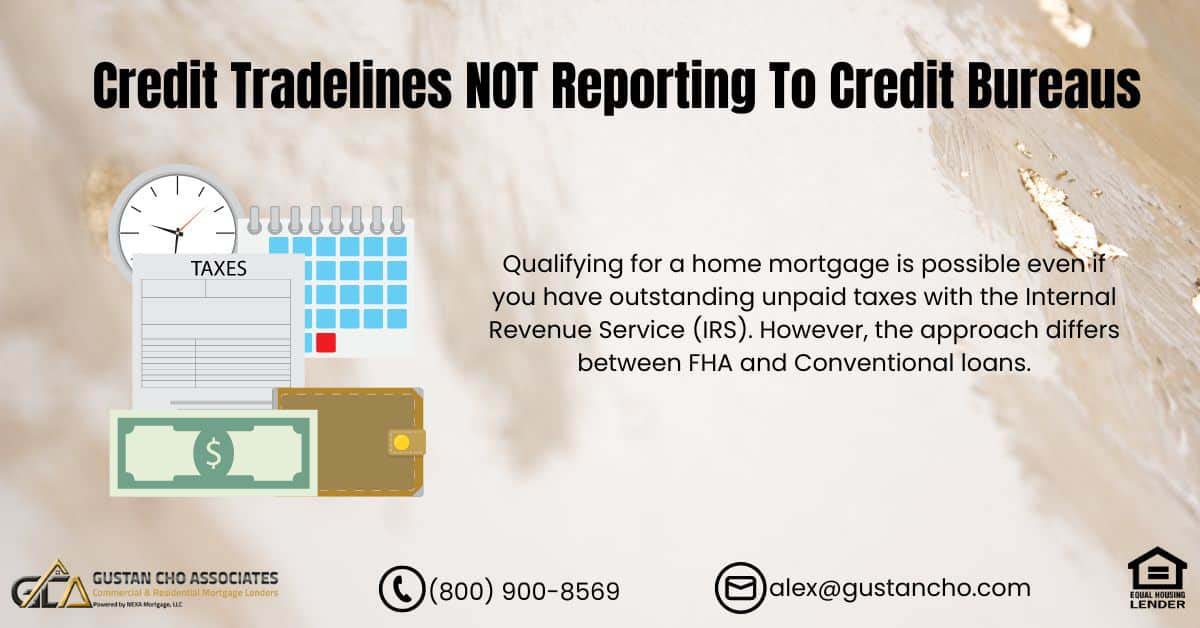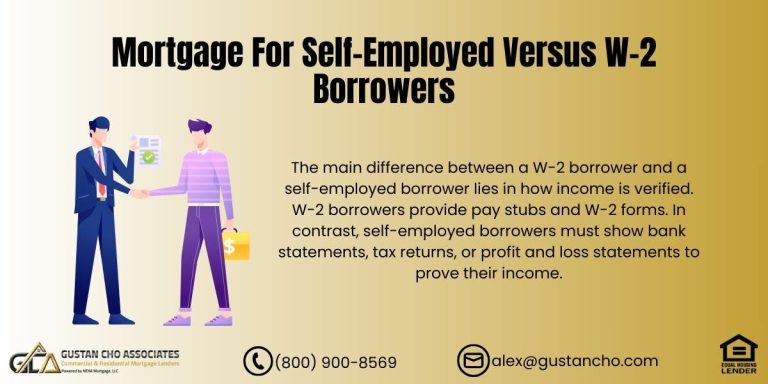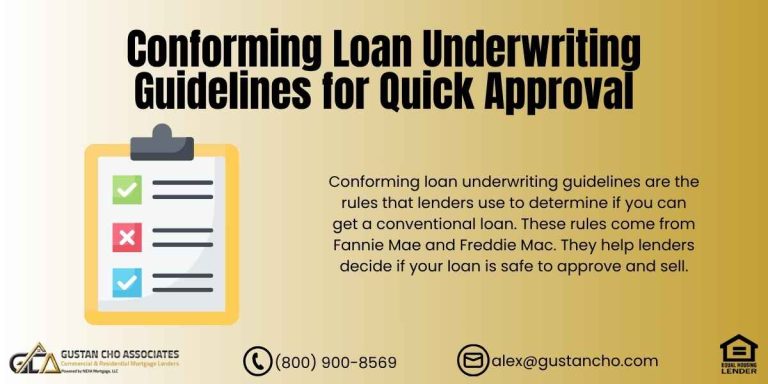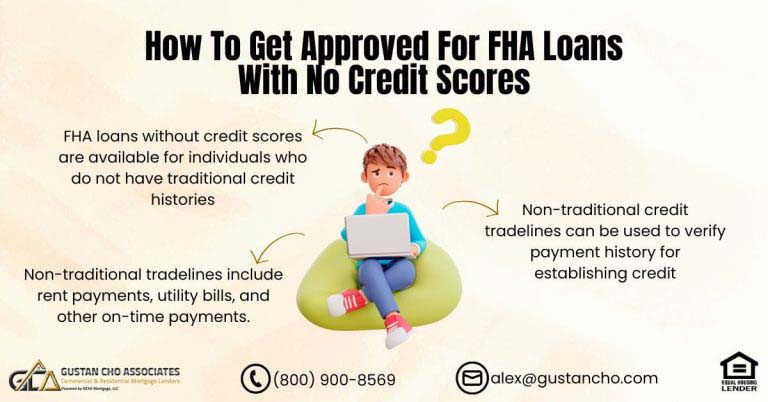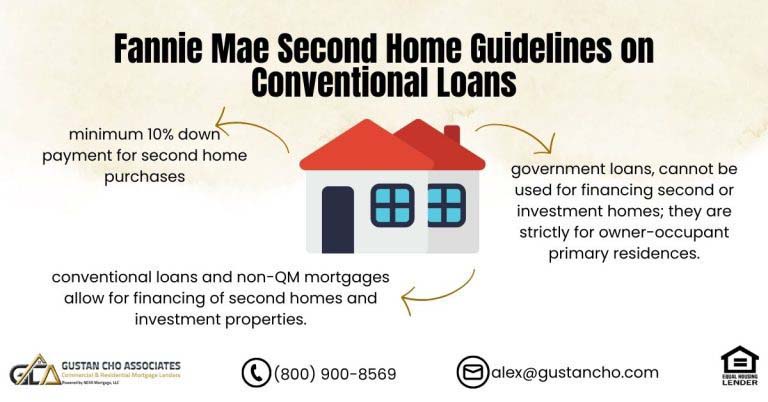Mortgage Guidelines with Unpaid Taxes: Qualifying for a Home Loan in 2024
Are you worried about unpaid taxes standing in the way of your dream home? The good news is that you can still qualify for a mortgage—even if you owe money to the IRS. However, the rules for mortgage guidelines with unpaid taxes depend on the type of loan you’re applying for, like FHA or Conventional loans.
In this guide, we’ll break down how unpaid taxes affect your mortgage application, what to do if you have unfiled taxes, and how to work with the IRS to improve your chances of home loan approval—looking to buy a home or refinance? This guide will help you through the process easily.
Is it Possible to Get a Mortgage with Unpaid Taxes?
Yes, getting a mortgage is possible even if you have unpaid taxes. But lenders want to know you’re responsible for paying off your debt. If you owe back taxes to the IRS, the lender will determine whether you have a payment plan, how much you owe, and how you manage your finances.
Let’s dive into the two most common loan options:
- FHA Loans: These loans, which are supported by the Federal Housing Administration (FHA), offer greater flexibility regarding outstanding taxes. You can have unpaid federal taxes and even tax liens if you have a written payment plan with the IRS.
- Conventional Loans: For loans backed by Fannie Mae or Freddie Mac, unpaid taxes without a tax lien are acceptable as long as you’re on a payment plan and you’ve made your first payment before closing. However, you won’t qualify for a conventional loan if you have a tax lien.
Worried About Unpaid Taxes to the IRS? You Can Still Qualify for a Mortgage!
Contact us today to learn how you can still qualify for a mortgage with IRS tax debt and what steps to take to improve your chances of approval.
How to Qualify for an FHA Loan with Unpaid Taxes
FHA loans assist borrowers with imperfect financial histories, including those with outstanding tax debts. But you’ll need to follow a few specific steps to qualify for a mortgage:
- Set up a payment plan with the IRS: If you owe taxes, the FHA allows you to qualify for a loan as long as you have a written agreement with the IRS. This agreement shows the lender that you’re handling the situation responsibly.
- Make at least three payments: Before you can close on an FHA loan, you need to have made three consecutive payments on your IRS payment plan. Remember that these payments cannot be lump-sum payments made all at once—they must be made over three months.
- Subordinate the tax lien: If you have a tax lien, the IRS will need to subordinate it, meaning they agree that your mortgage takes priority over the tax debt. This allows you to close on the mortgage without interfering with the tax lien.
If you work with the IRS early, you may still be eligible for FHA loans even if you have unpaid taxes or a tax lien. FHA loans are a good choice for people who have had financial difficulties in the past.
Market Liquidity By Selling Loans Funded After Closing
Lenders will use their warehouse line of credit to fund closed loans. However, they need to pay down the warehouse line of credit in order to originate and fund more loans and make money. Fannie Mae and Freddie Mac are the two largest buyers of mortgages on the secondary market.
Due to Fannie Mae and Freddie Mac buying mortgages on the secondary market, it provides liquidity to lenders to originate and fund more loans. The role of Fannie Mae and Freddie Mac is to provide liquidity in the mortgage and housing markets.
Qualifying for a Conventional Loan with Unpaid Taxes
Conventional loans are stricter when it comes to unpaid taxes. Here’s what you need to know if you’re applying for a Conventional loan and owe back taxes:
- No tax liens allowed: Conventional loans supported by Fannie Mae or Freddie Mac do not permit borrowers with current tax liens to be eligible, unlike FHA loans. Before applying for a conventional loan, you must address any tax lien.
- Payment plan required: If you owe back taxes but don’t have a lien, you can still qualify as long as you set up a written payment agreement with the IRS. You’ll need to make at least your first payment on the plan before closing on your loan.
- Debt-to-income ratio: Your monthly payments to the IRS will be factored into your debt-to-income ratio (DTI). Lenders typically prefer a DTI ratio below 43%, so making sure your payments to the IRS won’t push you above that limit is important.
Conventional loans can offer better interest rates and lower down payments. Still, they also come with stricter rules when it comes to unpaid taxes.
What About Unfiled Taxes? Can You Still Get a Mortgage?
Unfiled taxes can be a bigger issue than unpaid taxes. Lenders usually require your tax returns for the last two years to verify your income. If you haven’t filed your taxes, here’s what you need to know:
- FHA loans: The FHA could assist you even if you have outstanding taxes, but this is contingent on establishing a payment plan with the IRS and demonstrating efforts to address the situation. Additionally, you must furnish supplementary documentation to validate your income. These documents include bank statements, pay stubs, or self-employment profit and loss statements.
- Conventional loans: These loans are less forgiving when it comes to unfiled taxes. You may still be able to qualify if you show alternative proof of income, but lenders will check your financial situation closely.
How Do Lenders Know You Owe Taxes?
Lenders can find out about your unpaid taxes in several ways:
- Credit reports: If you have a tax lien, it will show up on your credit report. Lenders check credit reports to see if there are any red flags, like unpaid debts or liens.
- Tax transcripts: Many lenders ask for IRS tax transcripts as part of the mortgage application process. These documents show whether you’ve filed your taxes and if you owe any money.
- Public records: Tax liens are considered public records. Lenders often check public records to see if there are any liens or judgments filed against you.
If you owe taxes, it’s best to be upfront about your situation with the lender. Hiding unpaid taxes will only make things harder later in the process.
Have Unpaid Taxes to the IRS? Don’t Let It Stop You From Buying a Home!
Contact us today to see how you can still qualify for a home loan and take the first step toward homeownership.
Does an IRS Payment Plan Affect Your Mortgage Application?
Yes, an IRS payment plan can affect your mortgage approval, but it doesn’t mean you’re automatically disqualified. Lenders consider several factors:
- FHA Loans: FHA guidelines are more lenient when it comes to IRS payment plans. The FHA will likely approve your loan if you can prove you’re making timely payments.
- Conventional Loans: Conventional loans have stricter requirements. Lenders will assess how your IRS payment plan impacts your debt-to-income ratio and the timeliness of your payments. Approval can be more challenging if late payments affect your credit score.
What Happens If You Have a Tax Lien?
A tax lien is more serious than simply owing back taxes. It means the IRS has legally claimed part of your property as collateral for unpaid taxes. If you have a tax lien, here’s how it affects your mortgage application:
- FHA Loans: You can still qualify for an FHA loan even if you have a tax lien, as long as you have a payment plan in place and the IRS subordinates the lien.
- Conventional Loans: You cannot qualify for a conventional loan with a tax lien. You must resolve the lien before applying for the loan.
If you have a tax lien, the best thing you can do is work with the IRS to either pay off the debt or set up a payment plan.
Tips for Getting a Mortgage with Unpaid Taxes in 2024
Here are some key strategies to improve your chances of getting approved for a mortgage when you owe taxes:
- Set up a payment plan: If you owe taxes, start by arranging a payment plan with the IRS. Most lenders will want to see that you’re taking action to resolve your debt.
- Make payments on time: It’s important to make your tax payments on time, whether you owe taxes or have an IRS payment plan. Late or missed payments can lower your credit score and reduce your chances of getting mortgage approval.
- Communicate with your lender: Be open about your tax situation with your lender. They might have options or suggestions to help you navigate the process, especially if you’re applying for an FHA loan.
- Provide alternative documentation: If you have unfiled taxes, you’ll need to provide other forms of income verification, like bank statements, pay stubs, or profit and loss statements.
Ready to Buy or Refinance with Unpaid Taxes? We Can Help!
At Gustan Cho Associates, we specialize in helping borrowers with complex financial situations, including unpaid taxes. Whether you’re looking to buy your first home or refinance, we’re here to guide you every step of the way.
Have questions? Contact us today at 800-900-8569 or email alex@gustancho.com to see how we can help you get approved for a mortgage, even if you owe back taxes!
Frequently Asked Questions About Mortgage Guidelines with Unpaid Taxes:
Q: Can I Get a Mortgage if I Owe Unpaid Taxes?
A: If you have unpaid taxes, you can still qualify for a mortgage if you have a payment plan with the IRS to show that you’re managing the debt.
Q: Do Unpaid Taxes Affect My Chances of Getting a Mortgage?
A: Unpaid taxes can affect your mortgage approval, but with the right plan, like an IRS payment agreement, you can still qualify under mortgage guidelines with unpaid taxes.
Q: How Do Mortgage Guidelines With Unpaid Taxes Differ for FHA and Conventional Loans?
A: FHA loans are more flexible with unpaid taxes, allowing you to qualify with a payment plan. Conventional loans, however, don’t allow borrowers with active tax liens and have stricter rules.
Q: Can I Get a Mortgage if I Have a Tax Lien?
A: If you have a tax lien, you may be eligible for an FHA loan if you have a payment plan in place and the IRS subordinates the lien. Conventional loans do not allow tax liens.
Q: What Do Lenders Look for if I Owe Taxes?
A: Lenders check your credit report, IRS tax transcripts, and public records to see if you owe taxes. Following mortgage guidelines with unpaid taxes, they’ll also review your payment plan with the IRS.
Q: Can I Get a Mortgage if I Haven’t Filed My Taxes?
A: If you haven’t filed your taxes, getting a mortgage can be difficult but still possible. Lenders might work with you if you can show other proof of income, like bank statements or pay stubs, according to mortgage guidelines with unpaid taxes.
Q: How Can I Improve My Chances of Getting a Mortgage With Unpaid Taxes?
A: To improve your chances of getting a mortgage with unpaid taxes, you should first set up a payment plan with the IRS. Then, make timely payments and communicate openly with your lender. These steps help you qualify under mortgage guidelines with unpaid taxes.
Q: Does an IRS Payment Plan Affect My Mortgage Application?
A: Yes, an IRS payment plan impacts your application. Lenders factor your payment plan into your debt-to-income ratio, which is key to following mortgage guidelines with unpaid taxes.
Q: Can I Refinance My Home if I Owe Unpaid Taxes?
A: Yes, refinancing is possible with unpaid taxes as long as you have a payment plan with the IRS and meet the lender’s other requirements.
Q: What’s the Biggest Difference Between Owing Taxes and Having a Tax Lien?
A: Owing taxes means you have a debt to the IRS, but a tax lien means the IRS has claimed your property as collateral. Lenders follow stricter mortgage guidelines with unpaid taxes if a tax lien is involved.
This blog about “Mortgage Guidelines With Unpaid Taxes To The IRS” was updated on September 27th, 2024.
Unpaid Taxes to the IRS? Here’s How You Can Still Qualify for a Mortgage!
Contact us now to get expert advice on how to navigate the mortgage process and secure financing.


